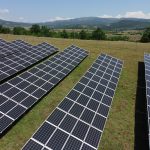EU countries spending billions of public funds on dirty fossil fuels. Top ten EU Member States have poured at least €78 billion euro into fossil fuel production since 1999, according to new research.
Our new report shows that the ten richest EU member states have poured at least 78bn billion euro into propping up the polluting fossil fuel industry.1 The report, produced by CAN Europe2 and CIDSE3, was presented at the UN Climate Change Conference in Lima, Peru. It calls on the EU and other developed countries to spearhead the elimination of the use of fossil fuels as soon as possible, and no later than 2050. Achieving the elimination of fossil fuel use means that the financial subsidies provided to the fossil fuel industry must be phased out immediately.
Of the countries analysed, the five biggest fossil fuel subsidisers were: 1. Germany with €47.5bn, 2. UK with €12.8bn, 3. France with €7.6bn, 4. Spain with €5.8bn and 5. Poland with €4.2bn.4 A lack of transparency and obligatory reporting on fossil fuel subsidies means these numbers are likely well below the true number. The ranking might be inaccurate as some countries are clearly more untransparent than others. In particular Austria, The Netherlands and Sweden have huge improvements to make in their reporting on fossil fuel subsidies.
The report also recommends governments redirect the money saved by halting fossil fuel subsidies towards addressing the impacts of climate change, as well as increasing renewable energy and energy efficiency in developing countries. As floods, droughts and other climate impacts increase, there is a clear need to ramp up support for the most vulnerable countries affected whilst also catalysing efforts to address one of the root causes of climate change – fossil fuels.
“Subsidising fossils fuels, one of the biggest causes of climate change is, incompatible with the EU’s commitment to avoiding catastrophic climate change,” said Maeve McLynn, policy officer at CAN Europe. “If we are going to have a clean energy system by 2050 then funding should be stopped immediately and phased out completely by 2020 in the EU,” she added.
In contrast to the huge subsidies for the fossil fuel industry, the EU only started delivering climate finance in 2010. The overall contribution to climate finance amounted to just €7.34bn between 2010 and 2012. In addition, EU Member States are falling short of reaching their fair share of the agreed 100 bn dollar goal for climate finance by 2020.
“The money that goes to developing countries to help them cope with climate change is tiny when compared to the billions spent in fossil fuel subsidies,” says Meera Ghani, Policy and Advocacy Officer for Climate Justice in CIDSE. “We should not make already rich polluting companies richer with public money, instead we should support low carbon development and climate resilience where it matters most. The EU needs to put its money where its mouth is when it comes to measures that will help us stay well below the 2 degree threshold.”
A major finding of the report is that several systematic barriers exist to the phase out of fossil fuel subsidies and use. There is no agreed global or European definition for subsidies, commitments made have been voluntary and no agreed reporting method has meant little or no progress on phase out. The report calls on the EU to implement a reporting mechanism and facilitate access to information on subsidies.
“Having a clear definition for fossil fuel subsidies, regular financial reporting and greater transparency on data are three crucial missing pieces in phasing out fossil fuel use and subsidies,” concluded Maeve McLynn, CAN Europe policy officer.
Download Missing Pieces: Steps to Phasing Out Dirty Fossil Fuel Subsidies in Europe
NOTES
1. The findings show that the ten wealthiest EU countries (by GDP) have spent at least €78bn on fossil fuel production subsidies between 1999-2013. This is a minimal figure and does not necessarily include externalities or export credit agency funds.
2. Climate Action Network (CAN) Europe is Europe’s largest coalition working on climate and energy issues. With over 120 member organisations in more than 25 European countries, CAN Europe works to prevent dangerous climate change and promote sustainable climate and energy policy in Europe.
3. CIDSE is an alliance of Catholic development agencies
4. All figures are based on data available between 1999-2013



